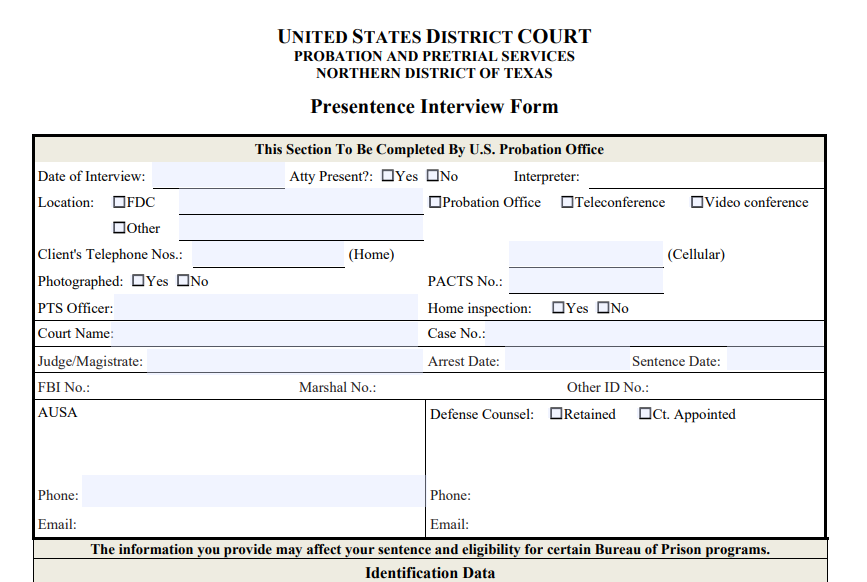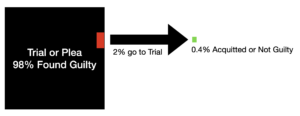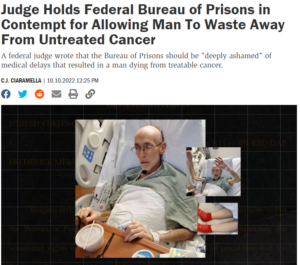What is The Presentence Report?
The PRESENTENCE REPORT (PSR), IS YOUR “REFERRAL” THAT CONTROLS ALL ASPECTS OF YOUR LIFE AND IMMEDIATE FUTURE – REDOS ARE VERY FEW, EXPENSIVE, AND HEAVY LIFT.
ITS ACCURACY AND COMPLETENESS CANNOT BE OVERSTATED.
YOUR NARRATIVE CONTAINS ALL THE CONTENT FOR THE PROBATION OFFICERS REPORT
IT IMPACTS YOUR,
Release Date
It includes You Accepting Responsibility,
Your Remorse,
Acknowledging Your Victim’s Pain
‘Standing Out To Your Judge.’ M. Santos interviews Federal Judge Mark Bennett on the importance of writing Your Personal NARRATIVE and including it in Your Presentence Report.
IT DETERMINES YOUR,
Medical and Mental Healthcare Needs
Psychology Programs – Limited Availability
FSA Programming, and Criminogenic Needs, Risk Assessment
For a personal, one-on-one call with me to discuss your current issue or that of a loved one, give me a call (240.888.7778). If I cannot answer, please leave a message, as I personally return all calls. Marc Blatstein
We are not Attorneys; you need Legal Representation.
BEING PREPARED – SUMMARIZED:
- PREPARED FOR YOUR FIRST MEETING WITH YOUR UNIT TEAM:
- 1st) AS SOON AS YOU ARRIVED AND LOCATED A COMPUTER, YOU HAVE ALREADY TAKEN YOUR FSA–SPARC-13 RISK ASSESSMENT SURVEY,
- 2nd)REQUEST TO PARTICIPATE IN THE FINANCIAL RESPONSIBILITY PROGRAM.
- YOUR PATTERN SCORE IS FIXED AT THIS MOMENT IN TIME – BUT CAN CHANGE; WHAT IS YOURS? (MALE or FEMALE)
- AS SOON AS YOU ‘FELT’ YOU WERE A TARGET
- INTERVIEW AND FIND A CRIMINAL DEFENSE ATTORNEY WHO PRACTICES IN FEDERAL COURT
AFTER YOUR GUILTY HEARING, YOUR ATTORNEY
- Has given you a long list of documents that the court needs copies of financial, medical, Biographical, and Identification Background Information
- Next, you begin a several-month writing project that includes;
- YourPersonal NARRATIVE, which will include a majority of the content needed for your
Presentence Report, plus your Allocution and
Release/Reentry Plan, where the Judge will ask you, “What is your plan for the future – to not re-offend?),
All of this, As You Prepare For,
YOUR PRESENTENCE INTERVIEW (PSI) – INVESTIGATION REPORT
- CONDUCTED BY THE PROBATION OFFICER – THE COURTS REPRESENTATIVE
PREPARATION FOR THE PRESENTENCE INTERVIEW.
9:30.7 Inside Baseball: Interview With Former Federal Probation Officer Tess Lopez
For a successful and productive legal process to occur, both counsel and clients must maintain a level of accountability and mutual respect. Additionally, active listening on both sides is crucial for effective communication and understanding. As part of this process, counsel will proactively reach out to Probation as needed, and defendants will provide their attorneys with all requested Biographical Background and Personal Identification information. By adhering to these guidelines, all parties involved can work towards achieving the best possible outcome.
It is critical to take time to draft a well-thought-out NARRATIVE and RELEASE Plan, including content relevant to the PATTERN score and Risk Assessment Survey. These documents are then woven together, organized, and prepared with accuracy and comprehensiveness before being given to the probation officer 1-2 weeks before the interview, to be eventually included in their PSR Under Seal.
The interview process holds immense significance as it offers a valuable chance for the Probation Officer to establish a personal connection with the client. Given the constraint of limited time, this opportunity is greatly appreciated by both parties involved. It allows for a deeper understanding of the client’s situation and helps the Probation Officer to provide tailored guidance and support.
The Presentence Report is a crucial tool that enables the court to take into account sentences that fall outside the guideline range. It’s important to note that the government typically does not provide this information voluntarily. By utilizing the Presentence Report, the court can make informed decisions about variances in sentencing.
- Counsel aims to determine the “dictation date,” which is the deadline for the P.O. to complete the initial draft of the official Presentence Report (PSR).
Upon commencing their work, the counsel and client are promptly informed of the specific timeline requirements to complete their respective tasks. Any legal or personal concerns that the client may have must be addressed within the given time frame, in addition to preparing for the upcoming interview. All necessary steps must be taken to ensure that the entire process runs smoothly and efficiently.
Requesting a minimum of three months to prepare for the interview is imperative. This request should have been made during the guilty hearing, and the judge must agree before setting the sentencing date.
Counsel should contact the PO before they speak with the Prosecutor. It’s important to build a relationship and assess what the PO knows. This allows the council to explain its position because the PO was not present in court and has not formed an opinion yet.
They may still have an open mind if they have not spoken with the prosecutor.
If the PO had already spoken with the Prosecutor before they ever met/interviewed you – they may have already been influenced, just not in your favor.
Your attorney aims to make their case and position with a personal meeting.
As you work on your personal narrative, it will undergo several revisions before reaching its final form. This is your chance to tell your story authentically and sincerely, taking responsibility for your actions. As you are writing try and keep in mind what your judge and Probation Officer are looking to hear and feel from you. By keeping these points in mind, will go a long way as you begin to tell your life story. Your Personal Narrative, as an integral part of your Presentence Report and will reflect your unique perspective on the events that led to your arrest.
Begin by writing your Release Plan, then prepare an Allocution for your conversation with the judge during sentencing.
When it comes to the Sentencing Hearing, remember to speak from your heart and answer the Judge’s questions truthfully. Your honesty will shine through and be heard by the Judge.
When making a prison placement request, Counsel will provide reasons for the request, such as medical or FSA programs.
BOP Example: FPC Alderson,
Counsel will outline each factor for the PO to consider under 18 U.S. Code § 3553
Part E (assistance in the investigation or prosecution of another, section 994 of title 28)
Part F (sentence below the guideline range under 18 U.S.C. §3553(a))
Defendant does Not Have:
1) more than 4 criminal history points, 2) a prior 3-point offense, or 3) a prior 2-point violent offense
- did not use violent threats
- did not result in death or injury
- was not an organizer, leader, manager, or supervisor
- defendant has truthfully provided the Government with all information and evidence
If the probation officer is open to a variation, persuading the court to impose a sentence below the guideline range could be crucial.
If your client is sentenced to prison, the Presentence Report (PSR) and Statement of Reasons (SOR) are crucial documents used by the BOP to determine their future.
During the probation officer meeting, the information presented will play a vital role in determining the client’s placement. Depending on the severity of the offense, the client may be sent to a dormitory-style camp or a maximum-security prison. This decision is especially crucial in complex cases involving multiple counts, various methods of calculating the guidelines and identifying the most appropriate guidelines to follow. Therefore, the information presented during the meeting must be accurate and comprehensive to ensure a fair and just outcome for all parties involved.
Establishing a connection with your probation officer by means of personal communication can be beneficial for your defense attorney to present their interpretation of the case, particularly in intricate cases.
To ensure the best outcome for the case, it may be beneficial for the lawyer to schedule a personal meeting with the Probation Officer (PO) if they were absent during the trial. As Probation Officers have a demanding workload, it is important to approach them with understanding and offer any assistance possible to ease their burden. By taking these extra steps, the lawyer can ensure that the PO understands the case and their position, which can positively impact the outcome.
It is advisable to promptly write a letter to the PO presenting your complete perspective on the case.
Before requesting relief from the Guidelines, having the Probation Officer and Assistant U.S. Attorney (AUSA) understand your client’s behavior and role in the offense is important. Also, ensure everything is completed and handed in before the interview and dictation date.
If you’re getting ready for a trial, it’s always wise to seek guidance from a Federal Defender on how to familiarize yourself with the judge’s preferences. You should inquire if the judge reads sentencing memos and character letters, and if yes, how long they should be. It’s also important to consider whether there are any issues like overcrowding, staff shortages, or any other factors that may impact your client’s ability to access the necessary services. By taking these steps, you can ensure that your client receives the best possible outcome.
Mental Illness: Was this a contributing factor, or has there been significant abuse or trauma? Either way, they should be evaluated, and if you are unsure of a local expert, ask the prosecutor for recommendations.
- If there is a current treating therapist, it is best for all if they appear as witnesses; most judges would rather hear from a treating physician than a doctor for hire. This is not to put down experts, as they provide expert testimony that can only come from a select few.
- If, on their own, treatment was started before the indictment, Guilty Hearing, PSI, or Sentencing, all the better. (AA, NA, GA, Psych. Counseling); this needs to be included in the PSR, Sentencing Memorandum…
- A White Collar defendant, where after an extensive interview, the following is the result of a mental evaluation,
- Exceptionally bright, high-functioning, and very successful individual.
- He/She is very skilled, highly motivated, and works 18-20-hour days for money-promotions-privileges.
- The client is an obsessive-compulsive perfectionist.
- Suffers from depression and anxiety.
- Having an overwhelming desire to be successful, personally and financially
- This may cause an ordinarily law-abiding person to “cross the line” into inappropriate or illegal behavior.
- Familiar?
- Later diagnosed with bipolar disorder
- Latest statistics by the U.S. Sentencing Commission
- 6 percent of inmates received downward departures for diminished capacity (U.S.S.G. §5K2.13).
- If half of the inmates have symptoms of mental health problems,
- yet only 2.6 percent are receiving departures, are the judges simply insensitive?
- Or does the problem lie at the feet of the defense counsel, who is not taking the time to investigate the client’s social and psychological history thoroughly?
- Unfortunately, I believe it is the latter. Tess Lopez.
Character Letters: only pick out a few to discuss in the memorandum, but add at the end that “there were another 50 that all said similar things, and the PO has those.”
If an employer is willing to write a character letter that says they will rehire you due to your skills and character once you are released – that is a Great letter for The NARRATIVE and Release Plan.
The Sentencing Memorandum is best submitted approximately seven days before the sentencing hearing,
Corroborate your defense and placement request with the appropriate supporting documents, albeit a doctor’s letter/ report/ medical/treatment records, etc. Remember to document, document, document.
All of this is preferably done under seal via the Probation Office so that the information is appended to the PSR when given to the BOP.
Therefore, including it in some manner during the Presentence Interview is optimal.
In The Sentencing Memorandum, give the Judge 1 or 2 cases with the highlighted pertinent points; if there is a video or pictures, include those.
- 18 U.S.C. §3553(a)(2)(D) requires a sentencing court to consider The Nature and Circumstances of the offense and The History and Characteristics of the Defendant. In the client’s NARRATIVE, most of this should be covered.
To determine which 18 U.S.C. §3553(a) factors apply, while someone with experience should:
1st) Conduct in-depth (multi-hour) interviews with the defendant, should an evaluation be needed (even in White-Collar). Now is the time, and
2nd) plus having the time (multi-hours) to speak with family members, close friends, and business associates or trusted employees to understand the person better.
As most Officers do not have ‘any’ time, at times, this is left to counsel to do themselves. This provides the opportunity to discuss hiring someone to do this part of the background work, or it may just not get done.
Evaluation of the care needed for a client’s medical condition – may support a cost-related (home confinement) argument.
This is most apparent in defendants diagnosed with a terminal illness or a diagnosis that falls outside the scope of what the BOP can provide (Long-Haulersor Post-COVID).
The cost of incarceration should also be factored into whether a sentence is “greater than necessary.”
Last are those, where appropriate, emphasizing to the court what the client would be doing if not incarcerated (i.e., working, supporting a family, paying taxes, and/or restitution).
The Presentence Report Determines Your Future – So Preparation For Your Interview is Vital
- Judges use the PSR to determine the length of a sentence.
- The Bureau of Prisons (BOP)uses the same PSR for prison placement.
- The PSR is again used by Probation during Supervised Release.
- Lastly, this same PSR becomes a permanent part of your record and the Inmates Bible – It truly is, the gift that keeps on giving.




 Allowing Man To Waste Away October From Untreated Cancer
Allowing Man To Waste Away October From Untreated Cancer







